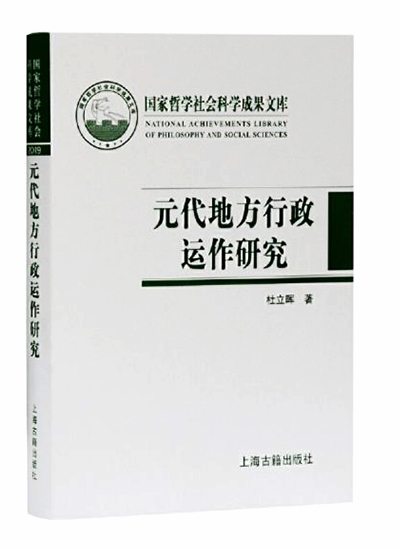A dynamic institutional history of Yuan Dynasty

Research on Local Administration Operation in the Yuan Dynasty
In recent decades, a new research trend in the history of ancient Chinese political systems has emerged, known as “living” institutional history. As historian Deng Xiaonan pointed out in her article, “Towards a ‘Living’ Institutional History—Reflections on the Study of the History of Bureaucratic Political Systems in the Song Dynasty” in 2003, the bureaucratic political system was not a static government form and organizational law, and the formation and operation of the system itself was a dynamic historical process. There is a “system” only when there is a “operation” and “process,” there is no “system” unless there is a “process.”
Research on Local Administration Operation in the Yuan Dynasty, by Du Lihui, a professor from the School of History and Culture at Shandong Normal University, exemplifies the exploration of local institutional history during the Yuan Dynasty (1271–1368) within the context of this emerging trend.
The literature unearthed at the ruins of Khara Khoto [also referred to as Heicheng or the Black Water] in Ejin Banner, Inner Mongolia, is considered one of the major archaeological discoveries in modern China. It consists of myriad Yuan documents that hold great historical and cultural research value. However, as most of them are residual segments written in semi-cursive scripts and are difficult to be identified and interpreted, they have not received sufficient attention from the academic community.
After diligent work on these documents in combination with handed-down literature, Du has made many refreshing breakthroughs in the dynamic research on Yuan’s local administrative systems.
The author sheds light on the local administrative institutions such as lushisi [administration offices for urban civil affairs] of Ganzhou Prefecture [present-day Zhangye City, Gansu Province] which had been previously overlooked by the academic community. Additionally, the author explores the procedures implemented by local supervisory organs to rectify unjust cases, as well as the organizational structure and operational mechanisms of zongguanfu [general governing office at a prefecture level] in Khara Khoto.
Du investigates the operation of a host of administrative affairs including taxation, grain tax collection, and the trial of cases. His research covers a variety of administrative and fiscal organs, including central agencies in local areas and zongguanfu, demonstrating the real administrative operation of multiple levels and types at the time.
Zhang Guowang is an associate research fellow from the Institute of History at the Chinese Academy of Social Sciences.
Edited by YANG LANLAN

 PRINT
PRINT CLOSE
CLOSE